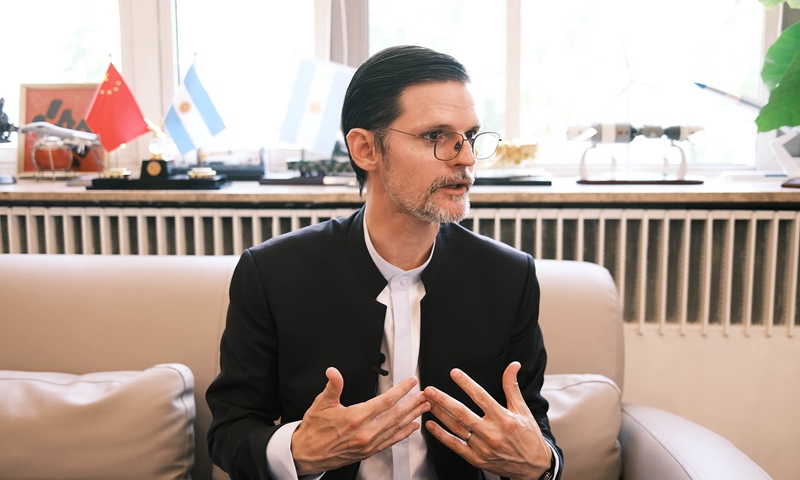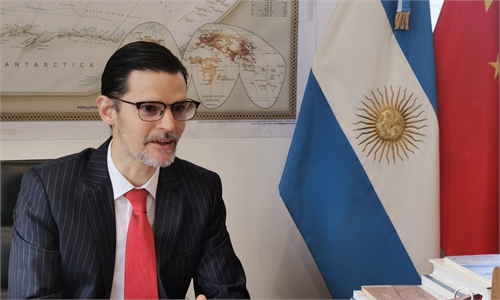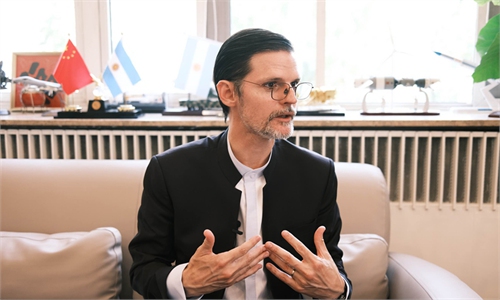IN-DEPTH / DIPLOMATIC CHANNEL
Exclusive: Argentine president to visit China this autumn, participate in third BRI forum: ambassador

Argentine Ambassador to China Sabino Vaca Narvaja Photo: Zhang Yashu/GT
Argentine President Alberto Fernandez will visit China in the autumn and participate in the third Belt and Road Forum for International Cooperation, Argentine Ambassador to China Sabino Vaca Narvaja told the Global Times in an exclusive interview.
During President Fernandez's visit to China in February 2022, China and Argentina signed a Memorandum of Understanding (MoU) on the Belt and Road Initiative. On June 2 this year, representatives of the governments of China and Argentina signed a cooperation plan in Beijing to jointly promote the construction of the Belt and Road Initiative.
Ambassador Narvaja told the Global Times he was delighted to see that Argentina and China signed the cooperation plan just one year after signing the memorandum of understanding for the BRI. He believes that it will serve as a "roadmap" for cooperation between the two countries within the framework of the BRI.
He said that Argentina is the second country in Latin America to sign a cooperation plan with China for Belt and Road construction following Cuba, which is a "very important milestone" for bilateral relations.
The Argentine diplomat also revealed that due to the importance attached to cooperation within the BRI and the relationship between China and Argentina, President Fernandez has confirmed his visit to China in the autumn and will participate in the third Belt and Road Forum for International Cooperation held in China. Additionally, a high-level delegation will accompany President Fernandez on his visit.
"Infrastructure issues are very important to us. China is cooperating with Argentina and providing financial support in development projects related to energy, railways, and nuclear energy," Ambassador Narvaja said.
As the world's eighth-largest country in terms of land area, Argentina requires significant infrastructure for its exports, growth and development. Narvaja expressed satisfaction with the signing of the cooperation plan for jointly building the Belt and Road Initiative with China.
According to information released by the National Development and Reform Commission, the plan will fully implement the significant consensus reached by leaders of both countries on promoting high-quality development of the initiative, and it will deepen collaboration in areas including infrastructure, energy, economy and trade, finance and culture.
As Argentina will hold presidential elections in the autumn of this year, how will the election results and government changes affect the relationship between China and Argentina and Argentina's attitude towards the Belt and Road Initiative? In response to this question, Ambassador Narvaja said the relationship between Argentina and China has "long-term stability." He stressed that regardless of government changes, cooperation with China will not regress, and coordination within the framework of the BRI will remain unchanged.
He cited historical examples of Argentina experiencing multiple government changes, including shifts between left-wing and right-wing governments, but almost all cooperative projects have continued to progress.
"Regardless of government changes, the Belt and Road Initiative is a plan that benefits Argentina nationally and across various sectors, promoting national development, employment, and investment... These projects improve the lives of Argentine people and are independent of government changes," he noted.
During the interview, Ambassador Narvaja also discussed the hot topic of the process of "de-dollarization" which is happening in various parts of the world. According to media reports, the People's Bank of China recently renewed a bilateral currency swap agreement with the Central Bank of Argentina. The deal has a scale of 130 billion yuan ($18.28 billion), or 4.5 trillion Argentine pesos, and it will be valid for three years.
Analysts believe that this currency swap will provide Argentina with more breathing space to cope with the peso sell-off and alleviate the country's inflation crisis. For China, it presents an opportunity to accelerate the yuan's globalization and reduce dependence on the US dollar.
Furthermore, Argentina and its neighboring country Brazil have recently expressed their intention to promote bilateral trade settlement in their respective currencies and are committed to launching a common currency for the South American region to reduce reliance on the US dollar.
"I believe the process of de-dollarization is inevitable. The future of emerging economies lies in conducting trade using their own currencies. It is beneficial to our trade not to rely on a single currency," Ambassador Narvaja told the Global Times.
"Taking Argentina as an example, our largest trading partner is Brazil, and the second-largest is China. Why should we trade with these two countries using a third currency, the US dollar? If we can use our own currency, it will reduce financial service costs and strengthen our fiscal and financial systems," he said.
The Argentine diplomat stated that he greatly appreciates Brazilian President Lula's proposal for a common currency among South American countries and a common currency among BRICS nations. He also strongly supports the internationalization of the Chinese yuan. "I'm not sure if regional or BRICS common currencies can be realized in the short term, but in the medium to long term, I believe it is the right direction," he noted.
According to a report in The Economist in March, from 2007 to 2021 more than half of the 62 loans granted by Chinese commercial banks in Latin America went to Argentina. Bilateral trade between Argentina and China has increased from $2.3 billion in 2001 to $26 billion last year.


